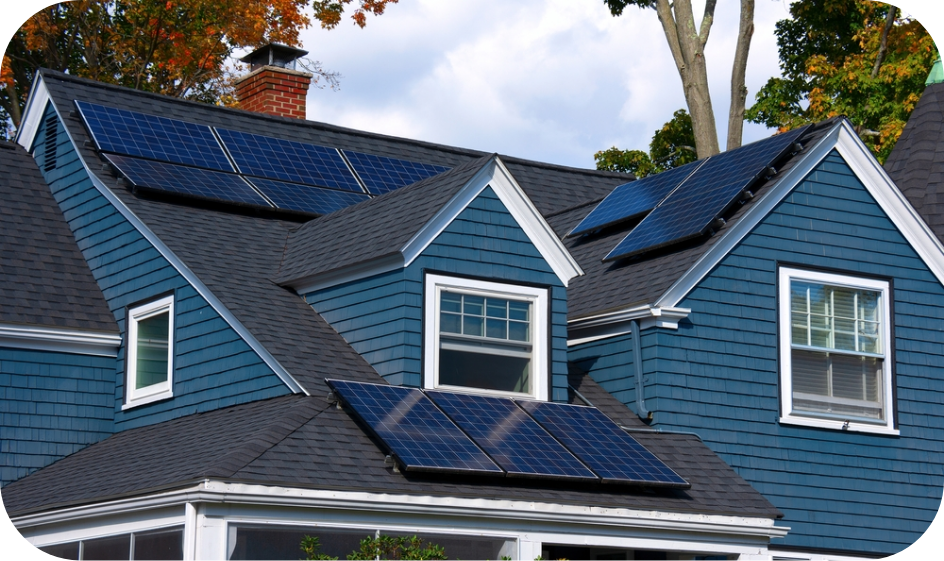The Environmental Impacts of Solar Energy


Solar energy has become a popular choice in the movement towards more sustainable energy. Over the past several decades, the cost of manufacturing solar panels and other equipment have come down to the point where it is now an affordable way for homeowners to power their home directly from the sun. This has made in an attractive option for those that are saving money and those that are conscious of their environmental footprint.
Homeowners that make the switch to solar rely less on grid power to power their everyday lives. But is it actually better for the environment? What are the benefits of solar, and how do they compare to fossil fuels? Below we will discuss the environmental impact of solar energy and what the solar industry is doing to make solar panel production more sustainable.
Benefits of Solar for the Environment
Many people switch to solar for its cost-saving benefits. By replacing grid power with rooftop solar homeowners are often able to reduce their electricity costs over time. As an added benefit, solar also benefits the environment. This makes solar a win-win as it can benefit the individual and society as a whole.
Here are some of the positive environmental impacts of solar panels.


Did you know?

Reduces Emissions
Grid electricity often relies on fossil fuels such as coal and natural gas. When used, they emit harmful greenhouse gases into the environment, which are a major contributor to climate change. Solar doesn’t emit greenhouse gasses; it merely harnesses naturally occurring sunlight to generate energy. When you use solar, you can help mitigate the impact of climate change by reducing the number of fossil fuels used to generate electricity.

Decreases Air Pollution
Not only do harmful gases contribute to climate change, but they also affect our health. Coal and natural gas are often burned to generate grid electricity, emitting toxic pollutants such as sulfur dioxide and nitrogen oxides. Because solar comes from the sun, there are no dangerous gasses involved. This improves the air quality and the health risks associated with air pollution.

Conserves Water
Traditional energy generation methods such as coal and natural gas require a lot of water for cooling and other processes. This can lead to water scarcity and damage to aquatic habitats. Many places already have limited water resources, and traditional power generation methods are putting significant strain on water supplies. By switching to solar, we can reduce water usage and its associated environmental impacts because solar energy requires little to no water to generate power.

Reduces Reliance on Non-Renewable Resources
One of the best benefits of solar energy is that it reduces our reliance on non-renewable resources like fossil fuels. Most of the resources used by grid energy are finite and will eventually run out. However, solar is a renewable resource that is available all over the world and may be used indefinitely. As long as the sun shines, solar panels can produce energy.

Promotes Sustainable Land Use
Harnessing existing infrastructure and underutilized spaces for solar can help mitigate the need for additional land for energy production purposes. Solar energy can make use of land that would otherwise be uninhabitable and can be installed on rooftops, in deserts, and on marginal lands that would be unsuitable for agriculture.

Mitigates Environmental Degradation
The ecological consequences of extracting and burning fossil fuels can be severe — ranging from deforestation to water pollution and destruction of habitats. Solar energy helps to reduce the frequency of coal mining and natural gas drilling and provides a cleaner alternative to these methods of energy production.
Environmental Impacts of Solar Panel Production
Many solar panel companies are switching to more environmentally friendly ways of producing panels. Below are some examples of how new sustainable measures are being implemented in different stages of solar panel production.
Solar Panel Facilities
Though some solar panel facilities still rely on coal for burning silicone for panel production, many facilities are moving away from fossil fuels. They’re relying more heavily on renewable sources like solar and wind. Additionally, many facilities have implemented closed-loop manufacturing systems that reduce waste and conserve resources. These facilities are reducing their environmental footprint by using recycled materials and reducing their need for raw material extraction.

Sustainable Mining and Manufacturing
Solar panels are made out of metals that producers obtain through mining. Mining has always had some negative impacts on the environment. However, many mining companies have adopted sustainable mining practices in recent years. They have implemented innovative strategies to reduce their environmental footprint, such as using renewable energy sources to power their operations and reusing wastewater for mining processes.
Solar panel manufacturing has also become more sustainable in recent years and continues to improve. Many manufacturers use recycled materials, reduce waste, and implement energy-efficient production techniques. The energy used to manufacture solar panels has also decreased, leading to a smaller carbon footprint. As solar manufacturing processes continue to improve, we may see a cleaner, healthier future for our planet.
Eco-Friendly Solar Panel Transportation and Recycling
The solar industry has improved its processes to reduce the environmental impact of solar panel transportation. Several manufacturers and transporters have switched to more sustainable transportation options, such as electric or hybrid vehicles. Many have also started optimizing their routes to reduce fuel consumption and emissions. Some companies are even looking at other transportation methods, like water or rail, which can further reduce their carbon footprint.
Though solar panels have a long lifespan, they eventually need to be replaced. Recycling can help reduce waste and decrease the negative impact of solar panels on the environment. Panels can be broken down, and their materials, such as silicon, glass, and metal, can be reused to manufacture new panels or other products. By recycling panels, the industry is reducing the need for new materials, conserving resources, and preventing waste.
Recycling solar panels hasn’t always been environmentally friendly. However, in recent years, the solar industry has made progress in developing efficient recycling techniques that decrease environmental harm.
Impacts of Solar and Electric Vehicle Charging
The benefits of solar electricity can be amplified further when it is used to power heavy equipment like electric cars, trucks and generators. In many instances these electric vehicles and appliances are still powered by the grid and thus by fossil fuels. However when solar is used as the charging source for an electric car, for example, then not only does the car not produce emissions but the electricity that it’s using is also renewable!
Homeowners that add solar to their homes may do so to control electricity costs associated with charging an electric vehicle or to stack this added environmental benefit of solar and further reduce their carbon footprint. While charging an EV at home may require a larger solar system due to increased electricity usage, it can be a great way to further reduce reliance on fossil fuels.

Is the Environmental Impact of Solar Energy Positive?
Overall, solar positively impacts the environment by reducing greenhouse gas emissions, conserving water, and reducing reliance on non-renewable sources. And while there are still some issues in solar panel production processes, many members of the solar industry are working to decrease any negative impacts by implementing more sustainable practices.

The Future of Solar — and the Environment — is Bright
Solar energy offers enormous potential for a sustainable and environmentally friendly future. As technology continues to advance and costs become more affordable, solar will only continue to become more accessible for communities, businesses, and individuals worldwide. As we harness the power of the sun, we can continue reducing greenhouse emissions, preserve our natural resources, and decrease our dependence on fossil fuels.
Collaborating Toward a Greener Tomorrow
A green future requires collective action from all of us — from governments and research institutions to businesses and homeowners. By supporting policies that incentivize renewable energy, investing in solar infrastructure, and promoting education and awareness, we can accelerate the transition to a more sustainable energy landscape. Together, we can make a significant and lasting positive impact on the earth for generations to come.
Make the Switch to Cleaner Energy
If you’re ready to reduce your carbon footprint while enjoying the cost-saving benefits of solar, we can help. At Axia Solar, we strive to help customers enjoy the benefits of energy independence and take control of their energy costs. Contact one of our solar advisors today and let us help you electrify your life.
Learn More
Want to learn more about how solar works? Check out these related articles. Have a question you can’t find an answer to? Contact us or chat live with an expert today.
Related Articles

